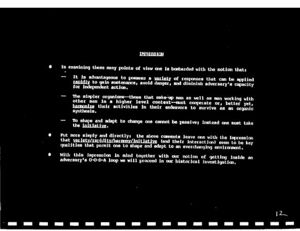Patterns of Conflict
| The works of |
| Works of John Boyd |
|---|
OODA WIKI Edition
Quantico Transcription
So knowing that, then, here’s an impression that I form. An initial impression. I’ll let you read it, then I’ll comment. [long pause as audience reads slide] Note the underlining, it’s very important, the underscoring. Let’s hit the first one. Note what I’m saying: variety and rapidity. You can avoid danger, diminish adversary’s capacity for independent action, and gain leverage over him et cetera. Why is that important? Very often you understand how important it is when you turn the argument around, come in from the back side.
Let’s assume we don’t have variety and rapidity, what’s that mean? It means you can’t adapt and you become predictable. And in conflict that’s the worst position to be in, where you can’t adapt and you’re predictable. The reason why you want variety and rapidity, is it allows you to adapt and remain unpredictable to your adversary, which gives you leverage. That’s the reason why. So if you have a very narrow response repertoire, they’re going get wise to you pretty soon and they’re going to kick you in the [unintelligible] over and over again.
Okay, and this one here, the second one. Note then: not only that, you’re working with other people, so you’re going to have to be able to cooperate with them and vice versa. Or what I call, harmonize your activities. So you can have focus, you can have direction, you can gain leverage. If everybody wanders off by themselves, all you’ve got is mass entropy, or internal friction. The whole thing comes unglued and you’ll be scarfed up as individuals. So without it, you’re going get leveraged by other people who know how to cooperate. You’ll be isolated.
''[05:00]''And note this one. Even if you have the harmony, you can’t just sit there and have these other three and let the world take care of you. You got to take initiative. You know how I define initiative? Very simple: the ability to think and take action without being urged. The ability to think and take action without being urged, that’s the key thing. Very simple.
So these are very important qualities: variety, rapidity, harmony, and initiative. So put more simply, if you can get that, then that’s going to permit you to do that, and later on I’ll show you how we take these two things and throw them together, variety and initiative, OODA loop, and see how they play upon one another, how one works with the other.
[unintelligible] We’ll be building up to that. Sort of give you these initial impressions, I just want you to get a feel for this kind of stuff. Everybody wants the perfect maneuver, there are no perfect maneuvers. In fact, I remember when I was out in Nellis in the 50s, guys had this so-called “last ditch” maneuver, but what if that doesn’t work? What are you going to do, die? You’ve got your favorite maneuver, it didn’t work. I said, Christ, that’s narrow, guys, you better have a repertoire of maneuvers. If that didn’t hammer him, you pull the son of a bitch apart. So if
you only got one thing you can do and the guy gets wise, that’s the end of the line for you, if he gets wise. It’s over. You’ve been had.
For you people in communications, any communications people here? Nobody? If you have a narrowband radio, you can’t examine the other bands, can you? If he’s got a wideband, he can examine yours, plus he can operate the other stuff and be hosing you and you don’t even know it. Same thing. So it’s like, variety and rapidity are like having a wideband filter and the other guy has a narrowband filter. You want the wideband filter. And if you’re only using Clausewitz, you got a narrowband filter through which you’re looking at the world of conflict. That’s what I’m trying to tell you.
